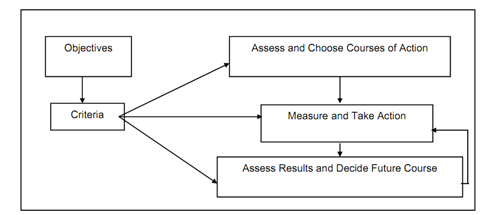Criteria Measures and Business Decisions:
A few years ago one of the US automotive companies determined ways to reduce waste by producing solely to demand and in small batches and changing layouts to diminish material handling costs. Definitely, this strategy gives positive results, including decreased inventories and greater flexibility. The problem was that the company's price accounting system, which measured results solely in terms of their effects on standardized financial criteria, showed bad results such as increases in indirect-to-direct labour ratios, non productive labour time, and decreases in overhead absorption. Since the system had no way of accounting for the improvements, the experiment was considered a failure and was cancelled. Therefore, it can be said that decision making should be based upon criteria compatible with the objectives and outcomes for those actions should be assessed using the same criteria. Figure delivers the role of criteria in decision making.

Figure: Decision Making and Assessment Process
Earlier, virtually all of the companies utilize standard cost accounting systems for measuring performance, but these systems, rely upon criteria that are outdated. Guided by traditional criteria, managers make decisions that look beneficial but in reality are worthless to the organization.